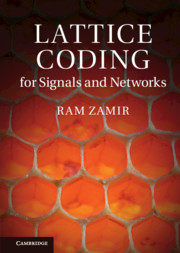 Lattice Coding for Signals and Networks
Lattice Coding for Signals and Networks Book contents
- Frontmatter
- Dedication
- Contents
- Preface
- Acknowledgements
- List of notation
- 1 Introduction
- 2 Lattices
- 3 Figures of merit
- 4 Dithering and estimation
- 5 Entropy-coded quantization
- 6 Infinite constellation for modulation
- 7 Asymptotic goodness
- 8 Nested lattices
- 9 Lattice shaping
- 10 Side-information problems
- 11 Modulo-lattice modulation
- 12 Gaussian networks
- 13 Error exponents
- Appendix
- References
- Index
11 - Modulo-lattice modulation
Published online by Cambridge University Press: 05 August 2014
- Frontmatter
- Dedication
- Contents
- Preface
- Acknowledgements
- List of notation
- 1 Introduction
- 2 Lattices
- 3 Figures of merit
- 4 Dithering and estimation
- 5 Entropy-coded quantization
- 6 Infinite constellation for modulation
- 7 Asymptotic goodness
- 8 Nested lattices
- 9 Lattice shaping
- 10 Side-information problems
- 11 Modulo-lattice modulation
- 12 Gaussian networks
- 13 Error exponents
- Appendix
- References
- Index
Summary
So far we have discussed source and channel coding problems separately. In this chapter we address the combination of the two, known as joint source-channel coding (JSCC). In a JSCC scheme, the encoder maps a source sequence into a channel input block, while the decoder produces a source estimate from the corresponding channel outputs. This mapping can be constructed using a concatenation of source and channel codes, in which case it is known as a separation-based scheme. While Shannon's separation principle states that this approach yields asymptotically the smallest possible average distortion, other schemes may have significant advantages as we will see in the following. For example, analog transmission (symbol-by-symbol mapping) has very desirable properties of low complexity and high robustness. However, except for some very special source-channel pairs, it is inferior to the digital (separation-based) approach in terms of average distortion. Therefore, finding schemes which are neither fully digital nor fully analog is of great interest.
In this context, lattices play a natural role: since they are defined directly in the Euclidean space, they do not require mapping of the source sequence into a digital representation and back, as done in a separation-based scheme. We shall present a “semi-analog” JSCC technique, based on lattice codes, called “modulolattice modulation” (MLM).
Information
- Type
- Chapter
- Information
- Lattice Coding for Signals and NetworksA Structured Coding Approach to Quantization, Modulation and Multiuser Information Theory, pp. 295 - 312Publisher: Cambridge University PressPrint publication year: 2014